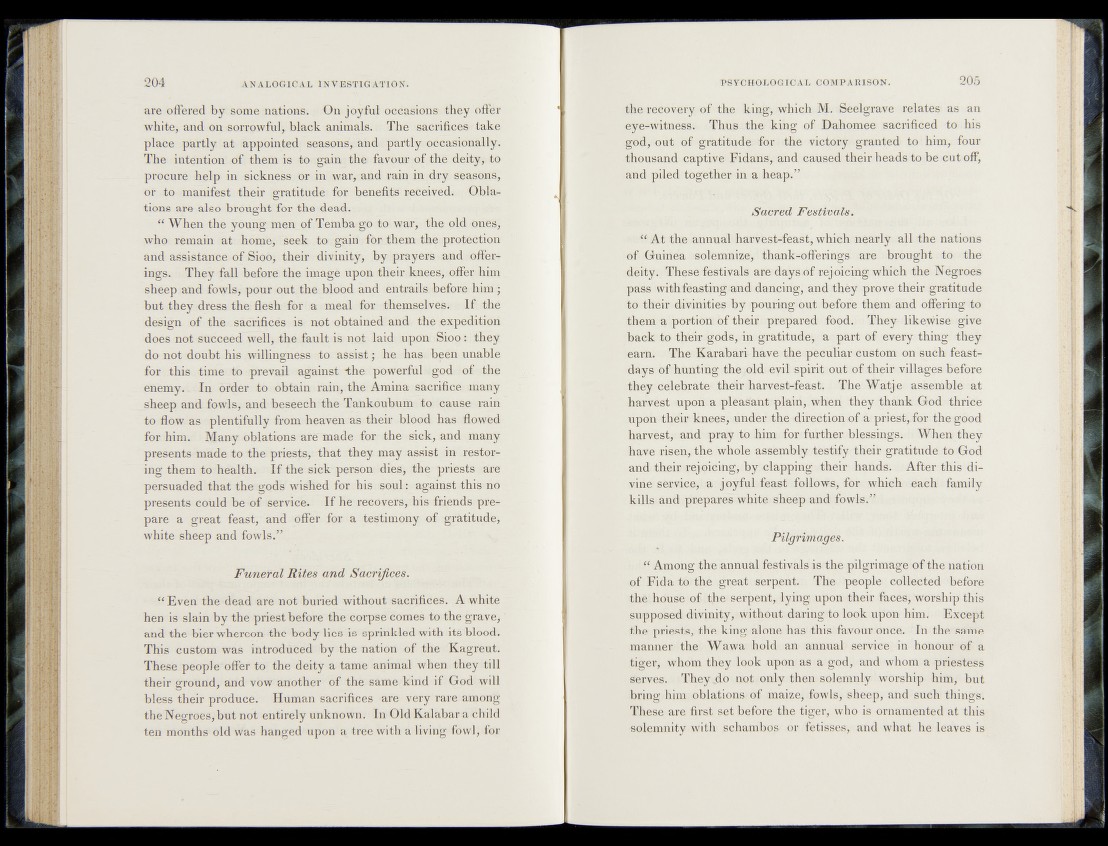
are offered by some nations. On joyful occasions they offer
white, and on sorrowful, black animals. The sacrifices- take
place partly at appointed seasons, and partly occasionally.
The intention of them is to gain the
procure help in sickness or in war, and rain in dry seasons,
or to manifest their gratitude for benefits received. Oblations
are also brought for the dead.
“ When the young men of Temba go to war, the old ones,
who remain at home, seek to gain for them the protection
and assistance of Sioo, their divinity, by prayers and offerings.
They fall before the imagé upon their knees, offer him
sheep and fowls, pour out the blood and entrails before him.;
but they dress the flesh for a meal for themselves*^ I f the
design of the sacrifices is not obtained and the expedition
does not succeed well, the fault is not laid upon Sioo : they
do not doubt his willingness -to assist ; h n hasà been unablf
for this time to prevail against “the powerful-godiof the
enemy.L In order to obtain rain, the Amina sacrifice many
sheep and fowls, and beseech the Tankoubum to; cause rain
to flow as plentifully from heaven as their blood has flowed
for him. Many oblations are made for the sick, and many
presents made to the priests, that they may assist in restoring
them to health. I f the sick person dies, the priests are
persuaded that the gods wished for his soul : against this no
presents could be of service. If he recovers, bis friendsifw®
pare a great feast, and offer for a testimony of gratitude,
white sheep and fowls.”
Funeral Rites and Sacrifices.
“ Even the dead are not buried without sacrifices. A white
hen is slain by the priest before the corpse comes to the grave,
and the bier whereon the body lies is sprinkled with its blood.
This custom was introduced by the nation of the Kagreut.
These people "offer to the deity a tame animal when they till
their ground, and vow- another of the same kind if God will
bless their produce. Human sacrifices are very rare among
the Negroes, but not entirely unknown. In Old Kalabar a child
ten months old was hanged upon a tree with a living fowl, for
the recovery of the king, which M. Seelgrave relates as an
eye-witness.. Thus the king of Dahomee sacrificed to his
god, out of gratitude for i-the victory granted to him, four
thousand captive Fidans, and caused their heads to be cut off,
and piled together in a heap.”
Sacred Festivals.
“ At the annual harvest-feast, which nearly all the nations
ids# Guinea solemnize, thank-offerings are brought to the
deity. These festivals are days of rejoicing which the Negroes
pass with feasting and dancing, and thèy prove their gratitude
to their divinities by pouring out before them and offering to
them a portion: of their prepared food. They likewise give
back-to thbir-gods, in gratitude, a , part of every thing they
earn. The Karabari have the peculiar custom on such feast-
days of hunting the ,old evil spirit out of their villages before
they celebrate- their harvest-feast. The Watje assemble at
harvest upon a pleasant plain, when they thank God thrice
upon their knees, finder the direction of a priest, for the good
harvest, and pray to him^for further blessings^ When they
have risen, the whole assembly testify their gratitude to God
and their rejpicing, bytelapping their hands. After this divine
serviced a joyful feast follows, for which each family
kills and prepares white sheep and fowls.’’
Pilgrimages.
“ Among the annual festivals is the pilgrimage of the nation
of Fid a to the great serpent. The people ; collected before
the house of tjie serpent, lying upon their faces, worship this
supposed divinity, without daring to look upon him. Except
the priests, the king alone has this favour once. In the same
manner the Wawa bold an annual service in honour of a
tiger, whom they look upon as a god, and whom a priestess
serves. They „do not only then solemnly worship him, but
bring him oblations of maize, fowls, sheep, and such things.
These are first set before the tiger, who is ornamented at this
solemnity with schambos or fetisses, and what he leaves is